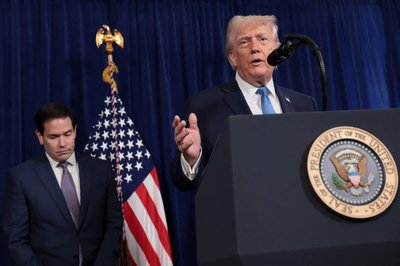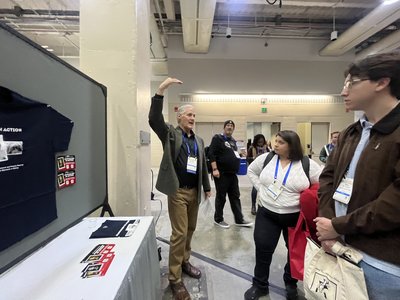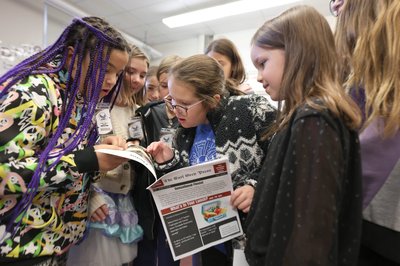This Educator Voice features Dr. Roxanne Moore, engineer and educator.
“I’m going to take you skiing for the first time. I’m going to go ahead and take you to the double-black diamond slope, a super steep hill and we’re going to look down. That’s a guaranteed way that you’ll never want to go skiing again,” says Dr. Roxanne Moore.
While you may take her statement as excellent winter sports advice, she’s actually guiding how we talk about intellectual property (IP). By using patents as the central focus of intellectual property discussions, we may be overwhelming young inventors and creators, leading many to abandon interest in intellectual property overall.
IP is so much more than just patents and can have a place in almost every person’s life, but how do we protect students from looking down the “steep hill” of intellectual property and lead them to more manageable routes?
"We need to meet kids where they are and where they’re going" - Dr. Moore
Dr. Roxanne Moore may have the solution and she’s navigated it herself. Dr. Moore – a multi-hyphenate – is a Senior Research Engineer at Georgia Tech where she received her PhD in Mechanical Engineering. She also teaches, leads the K-12 InVenture Prize , and coordinates research grants and initiatives focused on K-12 STEM education and diversity.
Outside of STEM, she has studied percussion alongside engineering at the University of Illinois and has worked as an artist decorating cakes and constructing edible gumpaste shoes. In other words, Dr. Moore is a creator who develops intellectual property in both her professional and personal life.
Everyone – from inventors, to musicians, to engineers, to artists, to computer scientists can benefit from knowing how to protect their intellectual property. While Dr. Moore has learned more about the impact of intellectual property, she has also noticed some of the fallout that comes with a lack of intellectual property knowledge.
In her experience as a cake decorator, she noticed that decorators often added intellectual property images from Disney characters to designer logos on their cakes, not realizing that using protected IP – even ones as ubiquitous as Mickey Mouse – is not only unethical, but can leave the artist vulnerable to a lawsuit.
WATCH: Student Voices: Watch these 3 TikTok interviews with inspiring student inventors
Later, as an educator, her department encouraged students to create websites to present their capstone projects, unaware that the public disclosure could have prevented students from receiving patents. In a more public case, Dr. Moore pointed out that even celebrity artists like Taylor Swift have struggled with intellectual property. “While we’re building creators – whether or not they rise to the level of being a patented inventor– the knowledge that you can own and protect your ideas in a creative economy is important,” says Dr. Moore.
But how should educators introduce this intellectual property knowledge to their students?
This is where her ski analogy comes back in. If educators introduce intellectual property through patents, students may feel overwhelmed and may shy away from the process. Not all students will go on to create patentable ideas and not all students and their families have the resources to pursue patents; however, all people can benefit from protecting their ideas and respecting other people’s ideas.
"...the knowledge that you can own and protect your ideas in a creative economy is important..." -- Dr. Moore
“We need to meet kids where they are and where they’re going,” says Dr. Moore. She suggests that educators should introduce students to the “bunny slopes” of intellectual property by introducing them to provisional patents and trademarks, like branding, logos and slogans first. Dr. Moore suggests using real-world conversation-starters like, “Can you slap Coca-Cola on a beverage can and go sell it?” Students will likely easily understand that it is silly and even unethical to pass a brand off as their own.
From here, an educator can explain that intellectual property protections help legally guarantee a creator’s ownership of their work. By talking about more accessible types of intellectual property first, students can build their knowledge and confidence about IP in the same way that novice skiers learn on the bunny slopes before they’re ready for the double-black diamond slopes.
On the slopes, a skier steadily moves from their days learning how to “pizza and french fry” to being an experienced shredder. They may later transfer their skills to snowboarding, skateboarding or even surfing. Likewise, a creator must learn the basics of intellectual property, trademarks, copyrights and provisional patents before they come up with the next influential idea (and maybe even patent it).
No matter where the creator or the skier ultimately takes their knowledge, building confidence from the ground-up is key for a lasting impact. “Intellectual property allows you to know what you own. If you’re generating ideas, content, writing, music, art or inventions – whether you’re doing that at a company or on your own – it helps to know who owns it and why,” says Dr. Moore, “Intellectual property education is empowerment!”
To read the full-length piece produced by our partners at the Intellectual Property Owners Education Foundation, click here.
Discussion questions
- Dr. Roxanne Moore says, "If you’re generating ideas, content, writing, music, art or inventions – whether you’re doing that at a company or on your own – it helps to know who owns it and why.” Why is it important to give people credit for their inventions?
- What problem have you solved creatively in your own life?
More about Dr. Roxanne Moore
Roxanne Moore is a Senior Research Engineer in the G.W. Woodruff School of Mechanical Engineering as well as the Center for Education Integrating Science, Mathematics, and Computing (CEISMC) at the Georgia Institute of Technology. Moore's research interests lie at the intersection of systems engineering, design theory, and artificial intelligence, with applications in industry, policy, and education and a focus on promoting diversity and inclusion. Her STEM outreach programs and curricula have impacted over 100,000 K-12 students nationwide. Moore received the Georgia Tech Teaching Effectiveness Award in 2018.
Fill out this form to share your thoughts on Classroom’s resources. Sign up for NewsHour Classroom’s ready-to-go Daily News Lessons delivered to your inbox each week.





